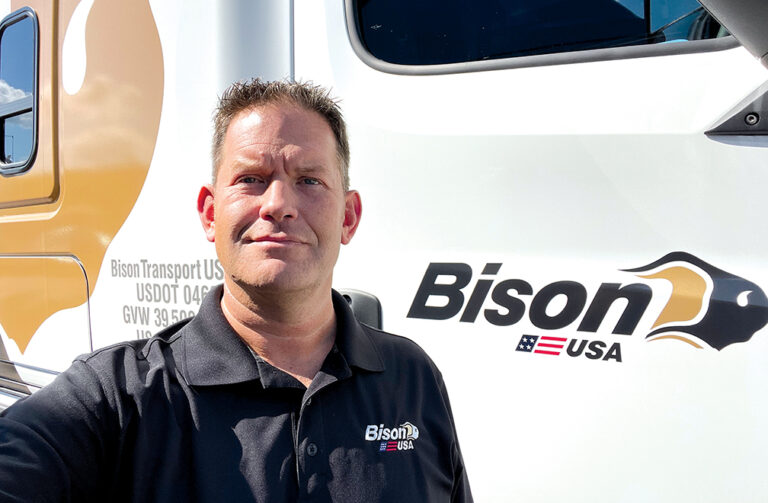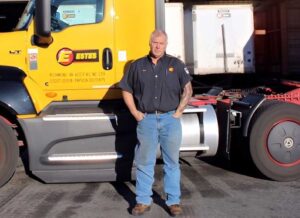In an era when contentiousness and political division are the order of the day, the Truckload Carriers Association’s (TCA) Regulatory Policy Committee provides a nonpartisan voice of reason on issues affecting the transportation industry.
Committee Chairman Jim Stockeland says the strategy is simple: Stand up for the industry instead of chasing headlines.
“I’ve found on my Hill visits — and I’ve participated in each of the last four with TCA — that when we work with both sides of the aisle in both the Senate and the House, they are very receptive,” he shared. “Certainly since COVID, trucking has been highlighted again and again as a significant piece of what keeps America moving each day. I would say lawmakers are very receptive, and concerned enough about the issues to ask us questions.”
Having the opportunity to talk to legislators face to face is vital.
“It is different in these conversations than the news bites you see on whatever network would have you believe,” Stockeland explained. “We’re dealing with folks in between each end of the spectrum who sound like and appear to desire to get things done. We want to build relationships and support their efforts and be the go-to when they have questions about the trucking industry.”
Stockeland, who serves as executive vice president of Bison USA, noted that the committee bandied several key issues on a recent visit to Capitol Hill, in the interest of informing legislators on industry conditions and proposals making their way through the legislative process.
“One obvious talking point was the shortage of at least 80,000 drivers,” he said. “We discussed a couple reasons around that, and some solutions that would help improve that.”
One of the suggested solutions — improving transportation infrastructure — was not one some lawmakers expected to hear.
“We asked lawmakers to ensure the money tagged for infrastructure actually goes to infrastructure spending to relieve bottlenecks in our interstate system,” Stockeland said. “When drivers have 11 hours to drive, but due to infrastructure challenges they can only get in six to seven hours, it’s not as exciting of a career. You sign up for full-time work and you only get part-time hours and part-time pay.”
Also under the banner of infrastructure, Stockeland pushed for building more parking facilities along major highways and interstates. Doing so, he says, would provide more convenient, secure parking on overnight hauls, providing a better overall work environment.
“Truck parking was high on our list with each visit we made,” he said. “You drive in the middle of our country in the prairieland, and trucks are parked on off-ramps. Truck stops are full. Rest areas are full. There’s a severe shortage of truck parking.
“To find safe and secure parking, drivers often park early, stopping an hour, two hours, three hours early or they travel off-route just so they can get a safe and secure parking spot for the night,” he continued. “As a result of this, our latest numbers show drivers lose an average of about $5,500 in direct compensation annually.”
Stockeland said committee members also informed lawmakers that such improvements could lend themselves to attracting more women into the industry.
“Female drivers right now make up less than 10% of truck drivers nationally,” he said. “We’d like to increase that. There are a lot of reasons women would be good for the trucking industry. They tend to be safer drivers and pay attention to detail. But if the majority of our male truck drivers are worried about safe parking, for sure the women would be concerned about that, and we’re concerned for them. So, it’s just another dovetail of that issue.”
Members weighed in on specific legislation, including one bill that could effectively end the owner-operator business model and another dealing with national speed limits. Stockeland says having a chance to provide meaningful input on issues that affect thousands of people who rely on trucking for their livelihood is one reason he enjoys serving on the Regulatory Policy Committee.
“I appreciate TCA’s view on building relationships with our delegations in Washington, D.C.,” he said. “I believe those relationships, over time, will yield results that are positive for our industry and for our country. I’m very interested in investing my time and energy towards building those relationships, being first on the issues, being able to speak on behalf of our industry, our association and our business.
“Things move very slowly in D.C.,” he explained. “Our opportunity through the TCA is being able to get involved and share our voice as those who are living and working in this industry every day.”
The committee also follows various legislation and regulations at the state level, such as recent laws passed in New York, California and elsewhere that will sunset diesel engines in favor of all-electric models in the near future.
“Certainly, there are some pretty audacious statements that come from lawmakers on occasion, when they may not have all the information on the industry or understand all of the impacts,” Stockeland said. “Our approach is, ‘OK, let’s watch this, see if it gains some steam. It may not be one of our Top 5 priorities today or something we need to act on right away.’
“There are examples where a law passes that affects the rest of the country, such as one in California a few years ago that restricted the age of the refrigerator unit on your trailer,” he continued. “So, it can happen, but there’s also a lot of outrageous statements that may appeal to a base on whichever side or gain some attention, but it is unfeasible or unlikely to stand up.”
Stockeland stressed the importance of participation in the committee’s activities for TCA members.
“We want your involvement,” he said. “Each voice helps. I see that on each visit to Washington, D.C. Lawmakers care about hearing from those who operate in this business and the more information we can bring, the more impact there will be.
“If there is a TCA member or nonmember who’s reading this article and they’re curious about how they can get involved or if they should get involved or if they should be a member of the TCA, I encourage them to reach out to me or to the TCA staff,” he concluded.
Dwain Hebda is a freelance journalist, author, editor and storyteller in Little Rock, Arkansas. In addition to The Trucker, his work appears in more than 35 publications across multiple states each year. Hebda’s writing has been awarded by the Society of Professional Journalists and a Finalist in Best Of Arkansas rankings by AY Magazine. He is president of Ya!Mule Wordsmiths, which provides editorial services to publications and companies.








